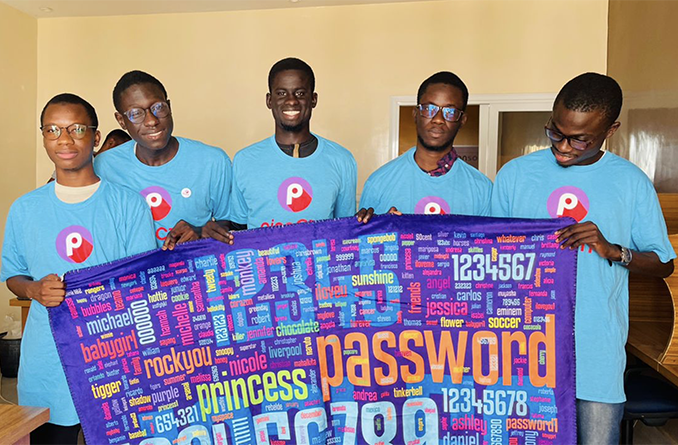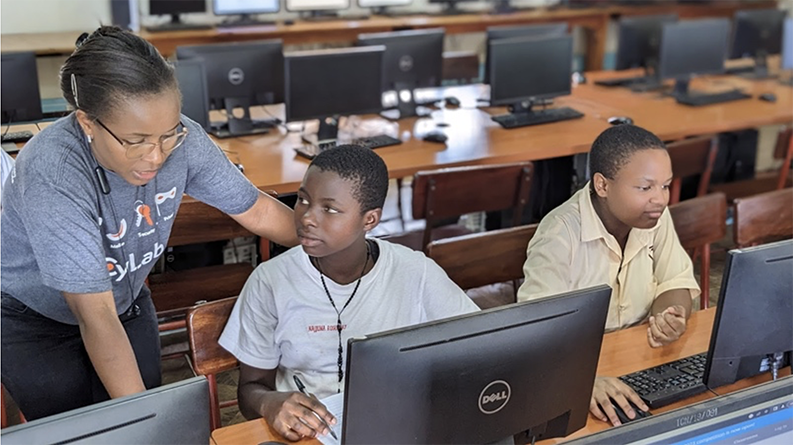picoCTF-Africa sees significant growth in competition’s second year
Ryan Noone
Jul 11, 2023
Cybersecurity continues to be a critical concern worldwide, with a shortage of skilled professionals amplifying the issue. Recognizing this challenge, Carnegie Mellon's picoCTF-Africa, a computer security competition for high school, undergraduate, and graduate students across the African continent, aims to generate awareness and introduce the field to the future workforce.
In just its second year, the cybersecurity hacking competition saw over 1250 students, as the number of female participants doubled, and the number of high school participants increased by more than 365 percent. Additionally, four teams finished in the top 50 on picoCTF’s global leaderboard, demonstrating the initiative’s immediate impact.
“When young Africans think about potential career paths, cybersecurity is rarely considered,” said Assane Gueye, co-director of the Upanzi Network and CyLab-Africa initiatives and associate teaching professor at CMU-Africa. “There is very little cybersecurity awareness for students entering college, and those who explore the field often do so after earning an undergraduate degree in computer science. But picoCTF-Africa intends to reverse that by introducing cybersecurity to high school students across the continent.”
We are delighted to see the increasing numbers of women participating in picoCTF-Africa.
Giulia Fanti, assistant professor, Carnegie Mellon University
“We are delighted to see the increasing numbers of women participating in picoCTF-Africa,” says Giulia Fanti, co-director of the Upanzi Network and CyLab-Africa initiatives and assistant professor in CMU’s Electrical and Computer Engineering Department. “Cybersecurity is a team sport, and we need to draw from the deepest possible pool of talent—that includes women and girls.”
picoCTF-Africa awarded the top teams in three divisions during its annual award ceremony, held at Carnegie Mellon University's Rwanda location, where each team received a fully-paid cybersecurity certification, electronic awards, and picoCTF swag.
High School Division:
1st place: CYBER-Warriors MPC (Rwanda)
2nd place: c0d3x (Rwanda)
3rd place: CCCGI (Rwanda)
Undergraduate Division:
1st place: Phantom_Troupe (Nigeria)
2nd place: class_3E (Ethiopia)
3rd place: D1AmbaR_Y1 (Senegal)
Women in Cybersecurity Division:
_Akatuski (Rwanda)
Prior to the competition, picoCTF-Africa actively engaged with students from high schools and universities in Rwanda, Kenya, and Uganda through in-person and online training sessions, covering a diverse range of topics, including basic Linux, Python, cryptography, forensics, binary exploitation, web exploitation, and more. Leveraging the picoGYM training platform, students gained hands-on experience and guided walkthroughs of previous challenges to enhance their skills and preparedness for the competition.
“During our visit to one school, we were confronted with an intriguing scenario. A teacher confided in us, saying that some of his students were actively requesting instruction in hacking,” said Lenah Chacha, research lab manager for the Upanzi Network and CyLab-Africa. “This disclosure initially sparked worry, but it also underscored the evolving educational requirements of students and the increasing significance of introducing cybersecurity concepts at younger ages.”
“The advent of picoCTF-Africa training has arrived at an opportune moment, serving to address these emerging needs while simultaneously generating significant interest among teachers.”
The advent of picoCTF-Africa training has arrived at an opportune moment, serving to address these emerging needs while simultaneously generating significant interest among teachers.
Lenah Chacha, research lab manager for the Upanzi Network and CyLab-Africa, Carnegie Mellon University
Acknowledging the importance of collaboration, picoCTF-Africa has teamed up with various organizations and institutions in each participating country. Ministries of ICT, universities, high schools, national communications commissions and previous players have joined forces to support the initiative and foster the growth of cybersecurity in Africa.
“I am glad to see the massive increase in participation, and I’m confident the trend will continue far into the future,” said Dr. Edwin Mugume, professor at Makerere University. “I believe the pre-event training sessions have played a major role in the competitions' growth here in Uganda.”
“In 2022, I received a call from a contact at CMU-Africa who shared information about a new program focused on teaching high school students cybersecurity skills,” said Innocent Hishamunda, an IT trainer at SOS Technical School in Rwanda. “At the time, I had very few students interested in cybersecurity, but today, thanks to the work of the picoCTF-Africa team, I have many students interested in pursuing degrees and careers in the field.”
Looking ahead, picoCTF-Africa aims to involve every African country in promoting and encouraging young learners to participate in cybersecurity challenges, fostering capacity-building, and creating a vibrant cybersecurity ecosystem.
“We look forward to continuing to grow the picoCTF-Africa program,” said Fanti. “My hope is that in a few years, we will start getting applications to CMU-Africa from students passionate about cybersecurity who got hooked through picoCTF-Africa.”
But the success of picoCTF-Africa is not limited to the competition. picoCTF-Africa plans to develop a cybersecurity training program for high school teachers, providing the knowledge and skills necessary to introduce cybersecurity education into their curricula. Through collaborations with organizations like Women in Technology, Software Engineering, and Cybersecurity clubs at CMU-Africa, picoCTF-Africa will look to increase its partnerships and expand its reach.
“The success of picoCTF-Africa could not be possible without the immense effort put forth by our teams in Kigali and Pittsburgh and the support we receive from partners like the Rwanda Ministry of Information and Communication Technologies, the Uganda Communication Commission (UCC), Makerere University, and Smart Africa”, said Gueye.


